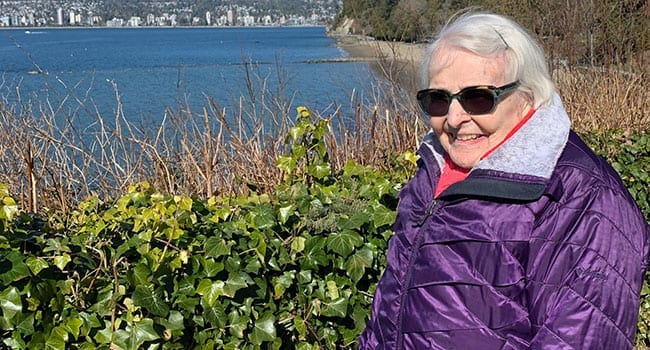 It’s tempting to think when you hit your 60s that you’ve seen it all, that your analysis of contemporary issues is tight and complete.
It’s tempting to think when you hit your 60s that you’ve seen it all, that your analysis of contemporary issues is tight and complete.
I’m here to say it ain’t.
That’s because I’ve just checked in with my 96-year-old Mom, Frances Robinson, after being in Mexico for a couple of weeks, forgetfully without a phone plan. Given that Mom no longer uses her computer for email, it meant that all forms of mother-son communication were stilled.
I came back eager to see how she was faring in the ‘old folks home,’ where she has her own apartment. She also has a growing band of buddies who she plays bridge with, and occasionally discusses the world of books, TV news, and all the inherent daily litany of shocks and appals.
This band of sisters (I have so far observed no brothers) has hundreds of years of memory storage, most of it Western Canadian, and all of it searchable for contemporary comparisons and parallels.
While Mom mostly is self-referential in terms of memory, she also checks and balances her opinions with broad input from her pals when she thinks it necessary.
So I was eager to see what was up, and to draw her out on the growing analysis of the global reappearance of populism, American and Russian treaty abrogations, the apparent disdain for political and scholarly elites of all types, and the acknowledged real and present danger of climate change.
Just for starters.

Mom (Frances Robinson) is more than happy to take a bite out of any topic. And her years of experience, knowledge and insight help give perspective to everything she surveys.
Mom’s always up for intellectual tennis.
I began with, “Have you ever seen things this crazy before, when you look back over 90 decades of life?”
“Oh god yes – and worse! You should have seen the Depression from my perspective as a young girl in Revelstoke. There were trains with hundreds of young men coming through town every day, looking for work and something to eat.
“My Dad, as a Department of Highways engineer, had to go down to the train station and speak to them. He said there were no local jobs, and only enough food for one loaf of bread per man per week. They didn’t like hearing that news. We had to get a big dog to protect us. And it went on for years. I’ll never forget it.”
“What about the onset and struggle of the Second World War?” I asked.
Here Mom couched her response in global terms. “The world was so big then. Europe was so big. It took forever to get to places, and people travelled by ship and train. The war seemed very far away. And it took ages to get the news. There was just one newspaper per day and the radio at night. Everything seemed so far away.
“We sent our English relatives parcels of things like nylons and chocolate that you couldn’t buy over there. It wasn’t until later that the casualty lists started to mount.
“And don’t forget that your Dad was still in med school at Queen’s. He never had to go and fight. But as the years wore on, there was plenty of horrible news. It wasn’t at all like today.”
Conscious of the need for some upbeat topics, we switched to her plans for the day.
She was eagerly awaiting the publication of the third edition of her retirement home newspaper.
She decided when she first moved in just over a year ago that the place needed a paper about the residents and so she organized a small band of helpers to accomplish just that.
Now they’ve finished issue three. More writers are pitching in, which is good thing because the first two issues had quite a bit of Mom in them, including illustrations.
“There’s a lot of good stories in this place and they need to be told. The people here need to learn about one another and the lives they’ve lived. Until I started the paper, this wasn’t being done.”
That last comment is true, as well as being classic Mom. She caught the reporting bug early, after her family moved to Williams Lake in her mid-teens.
Mom signed on as cub reporter with the legendary Ma Murray of the Bridge River Lillooet News. Ma ran a tight ship and signed off all her editorials: “And that’s for damshur.”
Mom’s that kind of old-school editor, too. She reads all my columns with an eagle eye. And I’m glad she does.
Troy Media columnist Mike Robinson has been CEO of three Canadian NGOs: the Arctic Institute of North America, the Glenbow Museum and the Bill Reid Gallery.
The views, opinions and positions expressed by columnists and contributors are the author’s alone. They do not inherently or expressly reflect the views, opinions and/or positions of our publication.

